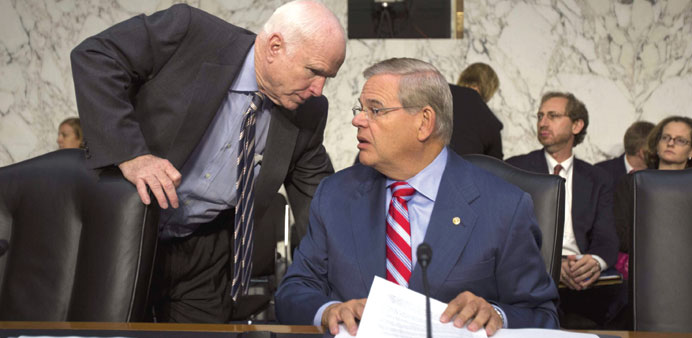Republican Senator from Arizona John McCain (left) talking with Democratic Senator from New Jersey Robert Menendez (right) shortly before the Senate Foreign Relations Committee approved the resolution giving President Obama authority to use force in Syria in Washington yesterday.
Reuters/Washington
|
|
The US Senate Foreign Relations Committee yesterday approved a resolution authorising a limited US military intervention in Syria, setting the stage for a debate in the full Senate next week on the use of military force.
The committee voted 10-7 in favour of a compromise resolution that sets a 60-day limit on any engagement in Syria and bars the use of US troops on the ground for combat operations.
The compromise is more limited than President Barack Obama’s original proposal but meets the administration’s goal of punishing Syria for what the US government says is the use of chemical weapons on Syrian civilians, killing more than 1,400 people.
The authorisation still faces significant resistance in Congress, where many lawmakers fear it could lead to a prolonged US military involvement in Syria’s civil war and spark an escalation of regional violence.
The full Senate is expected to vote on the resolution next week. The House of Representatives also must approve the measure.
Obama and administration officials have pushed Congress to act quickly, saying US national security and international credibility is at stake in the decision whether to use force in Syria to punish President Bashar al-Assad’s government for chemical weapons use.
“If we don’t take a stand here today, I guarantee you, we are more likely to face far greater risks to our security and a far greater likelihood of conflict that demands our action in the future,” Secretary of State John Kerry told the House Foreign Affairs Committee at a separate meeting yesterday.
“Assad will read our silence, our unwillingness to act, as a signal that he can use his weapons with impunity,” Kerry said.
The committee vote came after the two panel leaders - Democratic chairman Robert Menendez and senior Republican Bob Corker - crafted a compromise to meet concerns from some lawmakers that Obama’s resolution was too open-ended.
Republican Senator John McCain of Arizona had objected to the more narrow wording. But the committee adopted amendments proposed by McCain with policy goals of degrading Assad’s ability to use chemical weapons, increasing support for rebel forces and reversing battlefield momentum to create conditions for Assad’s removal.
Many lawmakers have said they are worried the resolution could lead to US ground troops, or “boots on the ground”, in Syria - which administration officials said would not happen.
“It’s very clear on the House side there is no support for boots on the ground,” House Foreign Affairs Committee chairman Ed Royce told Kerry at yesterday’s hearing, which also featured testimony from Defence Secretary Chuck Hagel and Gen Martin Dempsey, chairman of the Joint Chiefs of Staff.
Kerry answered flatly: “There will be no boots on the ground. The president has said it again and again.”
Earlier yesterday, President Obama issued a blunt challenge to sceptical US lawmakers, saying inaction would put America’s prestige and their own credibility at risk.
Using a visit to Sweden to build his case for military action, Obama insisted that the world could not remain silent after the “barbarism” of the August 21 chemical weapons attack by Assad’s forces.
“My credibility is not on the line. The international community’s credibility is on the line,” Obama told a news conference in Stockholm.
“And America and Congress’ credibility is on the line, because (otherwise) we give lip service to the notion that these international norms are important.”

